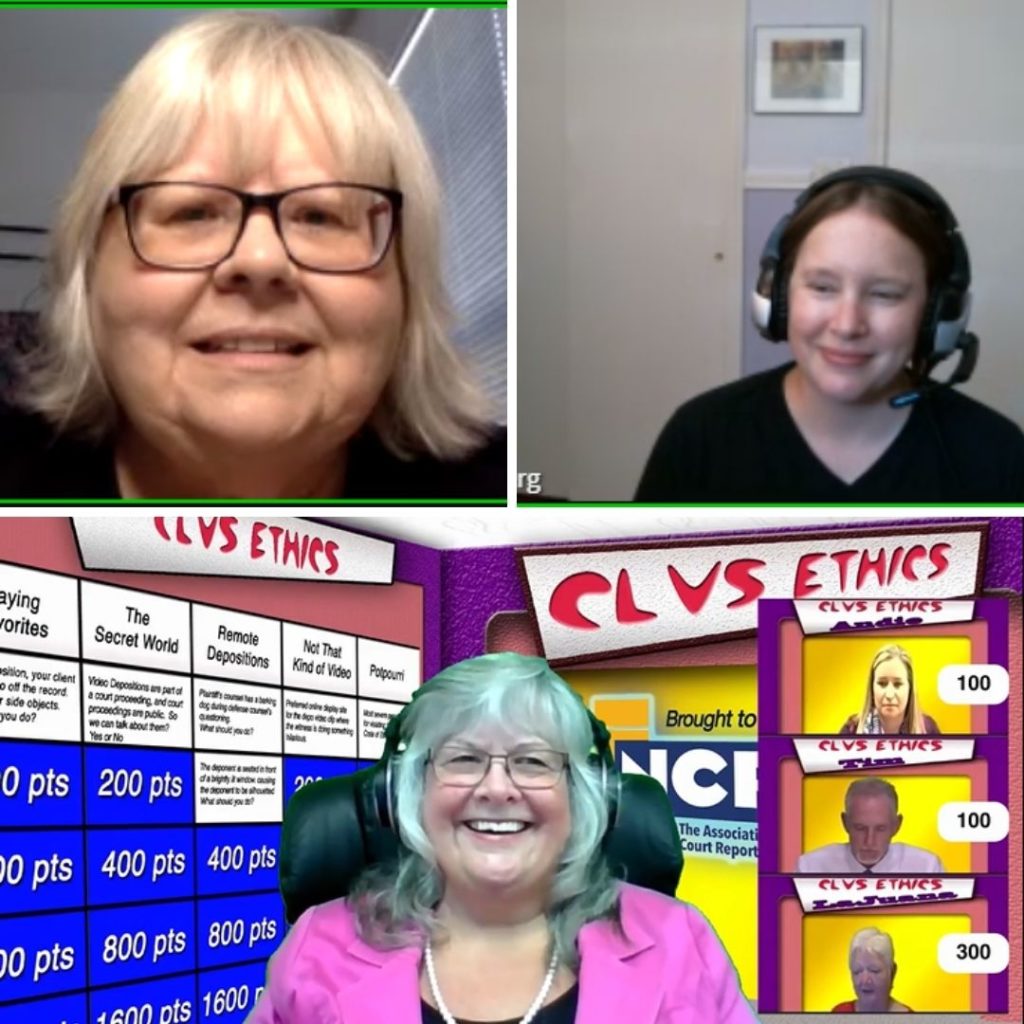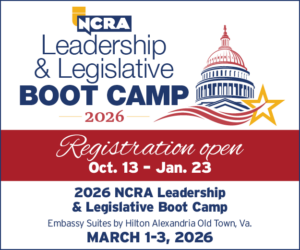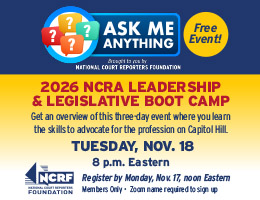
Attendees at NCRA’s Connect Virtual 2020 event held Aug. 7-9 enjoyed an array of insightful and informative sessions over the course of nearly three days. Sessions addressed topics from tips and tricks for making more money; organizing home offices; working smarter, not harder; and writing shorter and faster.
Below is a brief look at some of the major points made by the presenters in each of their sessions.
Everything has its place
Presenter Kristina Tan, a freelance court reporter from Richmond, Va., shared an in-depth, live tour of her home office with attendees who took part in her session entitled Learn the Skills to Organize Your Office, Your Daily Work Equipment, Your Life. Tan shared everything from why she loves her docking station (because when she gets home from a job she just plugs her laptop into it and her office comes alive) to showing off her 32-inch monitor and how she uses the app Snap to display multiple screens on it at one time. Another of her favorite office accessories is a cord keeper that helps keep all of her cords and adapters neatly together.
She also shared what she keeps in her go bag, as well as some apps she relies on to help her keep organized with day-to-day tasks.
“Everything has a place,” she said while displaying the items she finds necessary to keep in a to-go bag, including an ethernet cable, external web cam, and an extra mic with a long cord. To help with social distancing at jobs, she also carries along a table and relies on a longer mic cable to help.
“It’s important to stay organized. It saves time and reduces worry and stress,” Tan said. She also discussed the naming system she devised to keep each job and all accompanying documents and exhibits together in one place and suggested others do the same. Finally, she noted that two of her favorite apps she relies on include the self-employed version of QuickBooks to assist with keeping track of her mileage and something called Best Parking that saves her valuable time when she is headed to a job.
Watch your screen
Anissa Nierenberger, RPR, CRR, CRC, CRI, a captioner from Boise, Idaho, and founder of LearntoCaption.com, provided a slew of tips to attendees in her session Just Okay is NOT Okay; Is Your Realtime Good Enough? that can help court reporters and captioners write cleaner, faster, and ultimately make more money.
Among the top tips Nierenberger shared is to get used to watching your screen when you write. Glance up at your screen at least periodically so you can see mistakes that need to be fixed. Be aware that sometimes when you see examples of solutions it will trigger a solution that will work for you.
The less we write the fewer mistakes we will make. Better your realtime by using such tricks as creating brief families.
Finally, always continue to build your dictionary. Your dictionary is the most priceless thing you will own in your entire life. You can’t buy it. You will look back over many years and realize how long it has taken you to build it, so make at least three backups of it.
Mark those exhibits!
Court reporter Rene Moarefi, RPR, CRR, from Houston, Texas, reviewed how to mark exhibits in the session Marking Exhibits Electronically for Remote Proceedings. She looked at three popular electronic systems: Digitalexhibitstamps.com, Exhibitsticker.com, and Legalexhibitstickers.com.
She also discussed some of the pros and cons of each system, to make it easier for you to decide which to adopt into your remote depo freelance work. Moarefi also offered tips on what you need to remember as you start your workday to make it all run smoother.
Oh, no, the IRS
In Surviving an IRS Audit as a Court Reporter, NCRA Immediate Past President Max Curry, RPR, CRI, from Franklin, Tenn., shared his experience when his company was audited by the IRS. Although it is a scary process, he said, it is one you can survive. You never know when the IRS may turn its attention on you and your company.
Curry offered the lessons he learned, from proper documentation to how you want to categorize your court reporters. Being prepared is important!
The state of captioning
Captioners are adjusting to the many changes affecting their work, said Carol Studenmund, FAPR, RDR, CRC, from Portland, Ore., and Kelly Linkowski, RPR, CRR, CRC, CPE, from Rittman, Ohio, who presented a session titled The State of Captioning. The speakers urged attendees to recognize that there are individual actions that they can take to market themselves, such as earning certifications, staying educated on changes, and acting ethically, as ways to show their professional nature to their clients; likewise, acting together, such as through the National Court Reporters Association, captioners can influence the marketplace through conversations with the Federal Communications Commission and other national, state, and local organizations. Studenmund and Linkowski ended the session with a call to action to all captioners to consider themselves as ambassadors to their clients and the public in general.
Good job, you have your CLVS
CLVS Council members Mindy Sindiong, CLVS, from Lawrenceburg, Ind., and Andrea Kreutz, CLVS, from Des Moines, Iowa, presented a session that covered the basics of setting up a legal video business, who to market your business to, and how to further your business by joining with other groups and getting media coverage. Titled I have my CLVS. Now what? the session covered where to buy equipment, what insurance you need (and why you need it), how to get start-up funding, expanding your business, and much more. At the end of the session, the duo took questions from the live participants about the current state of their businesses and what work is like during the pandemic.
Are you motivated?
Do you have a fixed mindset or a growth mindset? That was the question that confronted Matt Moss, RPR, an official court reporter from Denver, Colo., as he spoke to fellow court reporter Lisa Knight, FAPR, RDR, CRR, a freelance court reporter and agency owner from Littleton, Colo., before attempting his certification exam a sixth time. Their conversation led Moss to seek out resources – from books to apps and exercises – on the topic of brain development and motivation, which coalesced into the session, Motivation, Beating Obstacles, Achieving Goals, and Growth Mindset. The session included a great list of resources to help build your own plan to build greater mental acuity and a personal path to success.
Come on and Zoom
How to use Zoom has been a hot topic for many reporters, and it’s a system that comes with both advantages and disadvantages. Myrina Kleinschmidt, RMR, CRR, CRC, a freelance court reporter, captioner, and agency owner from Wayzata, Minn., and her daughter, Sarah, who works as a trial technician, shared their own experiences with setting up Zoom depositions in the session Our Love-Hate Relationship with Zoom and How to Bring on More LOVE! Noting that mastering this technology helps keep the client in awe of your skills, the team shared a number of great hacks to set up your system, aid the attorneys and their clients with managing their options from computer screens or phones, and troubleshooting tips for audio, video, backups, and more.
The duo also walked the audience through a number of Zoom settings, such as renaming participants, pinning speakers, and using the breakout room functions, that can help in making the most of the deposition.
Social Media Bootcamp
Guest presenter Cathy O’Neal, communications director for Levitt Pavilion in Arlington, Texas, an outdoor concert venue that presents more than 50 free concerts a year, provided tips on getting started and being successful on social media in the session Social Media Bootcamp. She said it’s important to have a plan for your social media goals and to have a consistent voice with your messaging.
If you are using social media to promote your business, think about the elevator speech concept, she advised. “Think about describing your business in a nutshell and what you offer,” O’Neal said, and followed up by asking, “Is your social media goal to get more customers or show you are relevant in the industry? Decide what you want to do and go from there.”
Transition to Captioning
Amanda Lundberg, RPR, CRC, a broadcast captioner from Houston, Pa., started her session Transitioning to Captioning 101 showing what the experience is like for a person who is deaf by turning off her microphone and telling a story. She said to always keep in mind the experience for the people you are providing a service for. She then summarized the wide variety of places a captioner can work. She described the difference between court reporters and captioners and what it takes to have a captioning business. If you are a court reporter thinking about making the move to captioning, it’s very important to have strong realtime skills.
Lundberg said there is plenty of captioning work out there, and networking is the key. “Every job I have came through networking, and here we are at NCRA networking,” she said.




[…] Reprinted here with permission of the JCR – Journal of Court Reporting, a publication of the National Court Reporters Association. This article was originally published in thejcr.com. […]